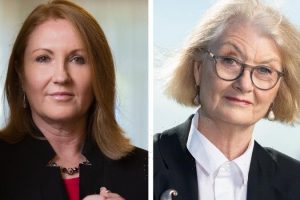Defamation wins and threats: congratulations, Kate McClymont, and we have your back, Adele Ferguson

I had planned to write my weekly note about the federal election and today’s editorial outlining why the Herald believes Scott Morrison does not deserve a second term, but I feel compelled to talk about two major developments surrounding our investigative reporting and the scourge of a booming defamation industry.
One development is positive and the other represents a grave threat to public interest journalism.
First, the good news: actor Craig McLachlan has today dropped his defamation case against the Herald just two weeks into the NSW Supreme Court trial. This is a big win.
McLachlan, 56, tried to sue the Herald, the ABC and actress Christie Whelan Browne over an investigation which alleged he indecently assaulted and sexually harassed female performers during the 2014 stage production of The Rocky Horror Show.
We had planned to argue the defences of truth and contextual truth, and 11 women were prepared to give evidence that they were harassed by McLachlan over the course of his career. It’s fair to say the first two weeks of the trial went badly for McLachlan – before we even called our own witnesses – and he has pulled the pin today, presumably before things got even worse.
The newsroom is thrilled about the decision because it vindicates McLachlan’s brave victims and the incredible work of our colleague, chief investigative reporter Kate McClymont.
The stories about McLachlan’s conduct were the product of months of dogged work and required enormous trust in Kate and the Herald from women who had already been through so much.
The executive editor of the Herald, The Age, WA Today and Brisbane Times, Tory Maguire, said the defamation case has had a chilling effect on the media’s ability to report serious allegations.
“The victims, the media and the public’s right to know have been damaged by this case more than any costs order can ever repay,” Tory said after the decision. I could not agree more.
Which brings me to the not-so-good news. Our satisfaction about the McLachlan development is tempered by our alarm over a court decision which threatens to undermine the foundations of investigative journalism.
Last Friday night, the NSW Supreme Court issued an extraordinary order requiring the Herald, The Age and 60 Minutes to hand over copies of an upcoming television program and newspaper investigation to an interested party before the content has been published or even completed.
The order, sought by Double Bay cosmetic surgeon Joseph Ajaka, would compel us to hand over draft copies of an investigation into the cosmetic surgery industry by our brilliant Gold Walkley Award-winning journalist Adele Ferguson.
We fought the application in court, arguing that to hand over copies of stories before they are published would place every plaintiff in the position of an editor. We had the orders stayed, pending an appeal.
But if upheld, the decision would set an alarming precedent. It could open the floodgates for the rich and powerful to ask the court to see our stories in advance and then launch legal proceedings to prevent publication. It is a fundamental threat to source protection.
Former Fairfax Media chief executive Greg Hywood told us on Monday that Australia already has the most draconian defamation laws in the Western world, and this would just be an added layer of restriction on the ability to publish issues of the public interest.
The Australian’s investigative journalist Hedley Thomas said if the court order became commonplace, it would hobble journalists “to the detriment of the entire community”.
“It is unthinkable that the work and stories of outstanding investigative journalists like Adele Ferguson are being abruptly suspended and possibly terminated by a judge’s order,” Thomas also told us in this story.
Herald investigative reporters Kate McClymont and Adele Ferguson.
As you’d be aware, we are also defending ourselves in a major defamation case launched by Victoria Cross winner Ben Roberts-Smith. The former soldier is suing the Herald, The Age and The Canberra Times over a series of articles in 2018 that he says accuse him of bullying fellow soldiers and the unlawful killing of Afghan prisoners. We are seeking to rely on a defence of truth.
Our reporters are tough but they are also human, and defamation cases can take a toll. They soak up precious time and energy. They are also expensive for us to fight.
Australia’s defamation laws are broken and need urgent reform. They are a threat to press freedom and prevent your right to know crucial information.
I have been a fan of Adele Ferguson for a long time but have been struck by the strength, courage and integrity she has demonstrated since last Friday’s court decision. We will stick by her and her journalism.
We are determined to win this case, and I’ll make sure to keep you updated on the appeal.
Bevan Shields sends an exclusive newsletter to subscribers each week. Sign up to receive his Note from the Editor.
Most Viewed in National
From our partners
Source: Read Full Article

